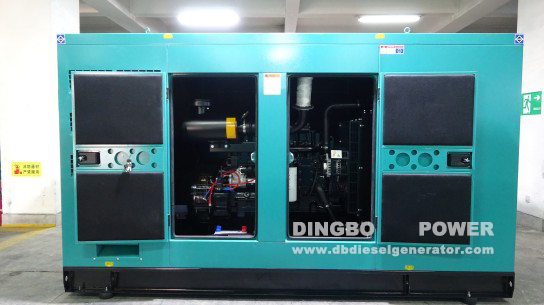Diesel generators have a reputation for being robust and reliable. However, like any other piece of machinery, they cannot be 100% reliable. It’s frustrating that your diesel generator fails to start in the event of a power cut. Understanding the common reasons why a diesel generator won’t start is essential for proper troubleshooting and maintenance. In this article, Dingbo Power explores 11 common causes for generator not starting and provides you with measures to fix it as well .
Lack of fuel
If your diesel generator runs out of fuel or has an insufficient amount of fuel, it won’t be able to start as usual. Therefore, when you experience generator failure, you should first check the fuel tank level and fill the fuel tank if the level is low.
Poor or contaminated fuel
Contaminated fuel, such as water or debris in diesel, can prevent your generator from starting smoothly. Low-quality fuel can’t support the operation of the diesel engine. It is essential to use clean and high-quality diesel. Remember that diesel fuel can last for around 12 months before serious degradation. If you have your fuel stored in the tank for long periods, consider testing the fuel to ensure it does not cause a fault in the future. Regularly monitor fuel storage conditions and address any issues promptly. If the failure is caused by contaminated fuel, you can fix the problem by draining the fuel in the fuel tank and filling the fuel tank with high-quality fuel. Diesel generators usually struggle to start in cold winter, read also useful tips on how to start a diesel generator in the cold.

Air in the fuel system:
If you fill the fuel tank properly but your diesel generator starts and then stops, there might be too much air in the fuel. Air can enter the fuel system sneakily when your engine runs out of fuel. Fuel filter replacement, leaks or repairs can also lead to airlocks. If this happens, it can disrupt the combustion process, causing startup issues. You can bleed your diesel generator by following the manufacturer’s recommended procedures. Remove the air in the fuel system and ensure proper fuel flow.
Battery failure
The battery is mainly used to start the diesel engine of the diesel generator. A battery failure can also prevent the diesel generator from starting. If your generator won’t start, it could be due to a dead battery or faulty connections. Check the battery voltage with a voltmeter or perform a load test to ensure it has sufficient power. Make sure the battery charger works properly. If it malfunctions, consider replacing it. Corrosion on battery terminals can hinder the flow of electricity and cause the generator won’t start. You can use a wire brush to clean the terminals and apply a protective coating to prevent future corrosion. Clean terminals and tighten connections regularly to prevent a potential for failure.
Clogged air filter
A dirty or clogged air filter can severely cut off fresh air flow to the carburetor and lower the engine's performance and horsepower. You can check the air filter and clean or replace it if it looks dirty. Follow the manufacturer’s recommendations and regularly replace the air filter.
Blocked fuel filter
A fuel filter is mainly designed to stop fuel impurities from getting into the engine or parts of the fuel system where they can cause problems. If the fuel filter becomes dirty, your machinery performance will be affected negatively. Blocked fuel filters will make starting difficult or impossible. Check the fuel filter and replace it if it’s dirty. It’s important to follow the user manual to change the fuel filter regularly.
Faulty glow plugs:
Glow plugs are heating devices that aid in starting diesel engines. Faulty glow plugs can cause the engine to misfire. Glow plugs usually fail because of corrosion, overheating, mechanical damage, or metal fatigue. You can use a clamp-meter to test the glow plugs and replace them if necessary.
Low coolant levels
The coolant in a diesel generator set can maintain the operating temperature and ensure the overall performance of the engine. Without sufficient coolant, your engine could overheat. Overheated engines risk catastrophic failure, where they seize up entirely. Maintaining proper coolant levels is crucial to protect your engine from overheating damage. You need to check the coolant level regularly and top it up as necessary.
Low oil levels
Engine oil serves the crucial function of lubricating generator's moving parts and guaranteeing their smooth operation. Running with low oil level or no oil can cause severe wear and destruction to certain parts of your engine. Check the engine oil level regularly with the dipstick. Add more oil if the oil level is low. Please use the recommended type and grade of oil specified by the manufacturer.
Generator starter motor fault
A starter motor assembly is used to take a stored energy and convert it into mechanical rotation to crank the engine fast enough to begin the engine's ignition sequence. A faulty starter motor can also cause the diesel generator to fail to start. Check the starter motor for any obvious damage and replace it if necessary. If you are not familiar with this, consider asking a qualified technician for help.
Cables not plugged in
If the cables are not connected properly, your diesel generator also fails to start. Make sure the connections and terminals are not loosen or damaged. If the cables appear to be worn, replace them to ensure a good electrical connection.
Hope the information above will be helpful for you. If your diesel generator still fails to start, it is advisable to consult a professional technician to ensure a safe and efficient resolution. With almost 20 years of experience, Dingbo Power can provide you with the right advice and a generator to meet your specific power requirements. For any further information or assistance, contact us at dingbo@dieselgeneratortech.com.
Comments
Post a Comment